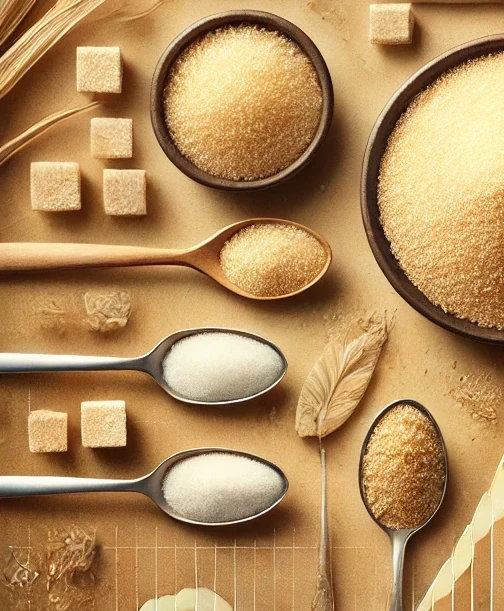Sugar is the reigning champion of sweetness, but in recent years, it’s faced stiff competition from artificial and natural alternatives like Splenda, stevia, aspartame, and more. Whether you’re trying to cut calories, manage blood sugar levels, or simply make healthier choices, the great debate between sugar and its substitutes can feel overwhelming. Let’s break it down and explore which option is best for your coffee, cookies, or daily diet.
What’s the Difference?
Sugar
- Source: Derived from sugarcane or sugar beets, sugar is 100% natural.
- Calories: Contains 4 calories per gram (about 16 calories per teaspoon).
- Glycemic Index (GI): High; sugar causes a rapid spike in blood sugar levels.
- Taste: Universally beloved for its clean, balanced sweetness.
Artificial and Natural Sweeteners
- Source: Lab-created or extracted from natural plants (e.g., stevia from the stevia plant).
- Calories: Most are zero or low-calorie.
- Glycemic Index: Typically very low or zero, meaning they don’t cause blood sugar spikes.
- Taste: Can vary—some mimic sugar closely, while others have unique aftertastes.
Key Contenders: Sugar vs. Sweeteners
| Sweetener | Calories (per tsp) | Sweetness (compared to sugar) | Glycemic Impact | Pros | Cons |
|---|---|---|---|---|---|
| Sugar | 16 | Baseline | High | Natural, perfect flavor balance | High in calories and GI; linked to weight gain and cavities |
| Splenda (sucralose) | ~0 | 600x sweeter | None | Zero-calorie, heat-stable | Artificial; may have a slight aftertaste |
| Stevia | 0 | 200x sweeter | None | Natural, zero-calorie, plant-based | Bitter aftertaste for some users |
| Aspartame | ~0 | 200x sweeter | None | Zero-calorie, widely studied | Not heat-stable; controversial in some studies |
| Saccharin | ~0 | 300x sweeter | None | Zero-calorie, long shelf life | Metallic aftertaste for some |
| Erythritol | 0.2 | 70% as sweet | None | Natural, low-calorie, gut-friendly | Can cause mild digestive issues |
| Monk Fruit | 0 | 150-200x sweeter | None | Natural, no calories, subtle flavor | Expensive and less accessible |
| Honey | 21 | Slightly sweeter than sugar | Moderate | Natural, contains nutrients | High calorie; still impacts blood sugar |
The Pros and Cons of Sugar
The Sweet Side of Sugar:
- Taste: Sugar is the gold standard of sweetness—no aftertaste, no fuss.
- Baking-Friendly: Its chemical properties are essential for texture and browning in baked goods.
- Widely Available: It’s affordable and found everywhere.
The Sour Side of Sugar:
- High Calories: Overconsumption can lead to weight gain and obesity.
- Blood Sugar Spikes: Causes rapid increases in blood sugar, making it problematic for diabetics.
- Linked to Health Issues: Excessive intake is associated with cavities, heart disease, and metabolic disorders.
The Pros and Cons of Artificial & Natural Sweeteners
The Sweet Side:
- Low-Calorie or Zero-Calorie: Ideal for weight management and calorie reduction.
- No Blood Sugar Spikes: Safe for diabetics and people with blood sugar concerns.
- Diverse Options: Whether you prefer natural (stevia, monk fruit) or artificial (Splenda, aspartame), there’s a sweetener for everyone.
The Sour Side:
- Taste Variations: Some sweeteners have noticeable aftertastes or don’t mimic sugar perfectly.
- Digestive Sensitivity: Sugar alcohols like erythritol can cause bloating or gas in some people.
- Controversy: Some artificial sweeteners have faced scrutiny over potential long-term health effects, though most studies show they’re safe in moderation.
Key Sweetener Showdowns
Sugar vs. Splenda (Sucralose):
- Best For: Splenda is a calorie-free alternative to sugar in beverages and baking.
- Downside: Splenda doesn’t caramelize like sugar, so it’s not ideal for all recipes.
Sugar vs. Stevia:
- Best For: Stevia is plant-based and works well in beverages or cold recipes.
- Downside: Stevia can taste bitter or licorice-like to some palates.
Sugar vs. Erythritol:
- Best For: Erythritol is great for diabetics or keto diets and performs well in baking.
- Downside: It’s less sweet than sugar, so you might need more of it.
Which Sweetener Should You Choose?
Choose Sugar If:
- You’re not concerned about calories or blood sugar levels.
- You’re baking something that requires sugar’s chemical properties.
- You want pure, classic sweetness with no aftertaste.
Choose Artificial or Natural Sweeteners If:
- You’re cutting calories or watching your weight.
- You have diabetes or want to avoid blood sugar spikes.
- You don’t mind experimenting to find the best-tasting alternative.
How Sweeteners Fit Different Lifestyles
- For Weight Loss:
- Opt for zero-calorie sweeteners like Splenda, stevia, or monk fruit to cut calories without sacrificing sweetness.
- For Diabetics:
- Stick to sweeteners with no glycemic impact, like stevia, erythritol, or aspartame.
- For Baking Enthusiasts:
- Use sugar for best results, but erythritol and monk fruit blends work well in sugar-free recipes.
- For Natural Purists:
- Choose honey, stevia, or monk fruit for sweeteners closer to their natural state.
Final Verdict: Sugar vs. Sweeteners
The choice between sugar and alternatives boils down to your priorities:
- If you value taste and tradition: Stick with sugar.
- If you’re watching calories or blood sugar: Opt for natural or artificial sweeteners.
Why not strike a balance? Use sugar sparingly for indulgent treats and sweeteners for everyday use. After all, life’s too short to skip dessert—just be mindful of how you sweeten it!






